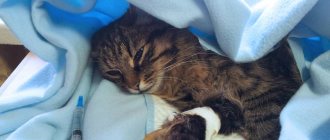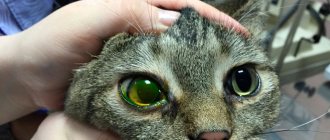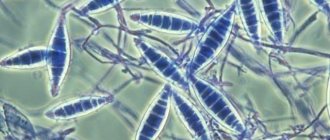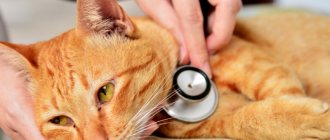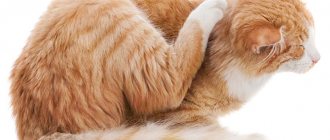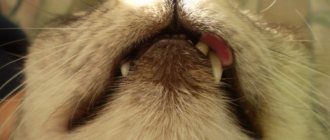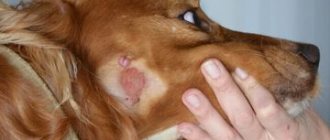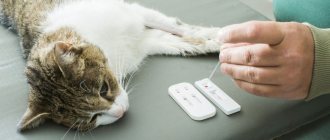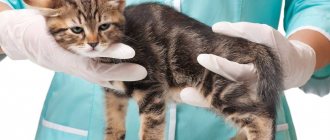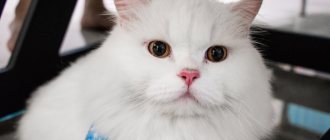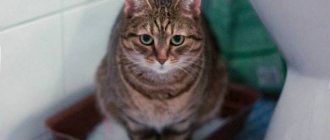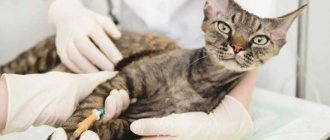Gastroenteritis is an inflammation of the stomach and small intestine, characterized by diarrhea and vomiting, accompanied by intoxication and dehydration. Primary gastroenteritis develops when inedible objects, products unacceptable for the cat’s diet, enter the alimentary tract, as well as a hypersensitive response to individual components of the feed. Secondary pathology occurs as a result of exposure to infectious agents or invasions. Pets of all ages get sick. The disease poses a threat to the cat's life.
What is the problem: reasons
The FCoV virus, which often mutates, can provoke coronavirus gastroenteritis. Carriage of parnovirus or hepatitis also influences the progression of pathology.
In pets, the gastrointestinal tract suffers from an unbalanced diet. There are the following causes of gastroenteritis in cats:
- Incorrectly selected food and other food products. Poor quality food, spicy, hard or salty food provokes an inflammatory reaction in the internal organ of the animal.
- Hearty food.
- Negative effects of heavy metal salts entering the body of cats through food intake.
- Allergic reaction to food.
- Treatment of a pet with pharmaceutical drugs. With long-term use of antibacterial agents, the gastric mucosa is irritated and gastroenteritis occurs in the cat.
Often a pet gets sick due to salmonella entering the body.
In pets, gastroenteritis can be a consequence of hairballs entering the gastrointestinal tract. Also, liver pathology becomes a source of the problem. Inflammation may occur against the background of pancreatitis or intestinal obstruction. According to statistics, an inflammatory reaction in the area of the stomach and small intestine is more often caused by viral and bacterial infections, such as:
- salmonella;
- coli;
- various helminths, in particular isospores, coccidia.
Causes
Feline gastroenteritis occurs for the following reasons:
- Traumatic injury when swallowing hard objects - fish bones, small toys.
- Formation of trichobezoars from hairs swallowed during licking. Long-haired cats are primarily affected.
- Sudden change of food.
- Eating food from the hosts’ table - fried, salty, smoked, sweet.
- Mixing dry granulated food with natural products.
- Poisoning by mice caught during deratization with anticoagulants.
- Complications of chronic non-communicable diseases.
- Side effects of medications.
- Contagious diseases of infectious or parasitic etiology.
- Formation of tumors.
Characteristic symptoms
Coronavirus gastroenteritis in kittens and adult animals may not be accompanied by any symptoms for a long time. When the disease worsens, the following pronounced signs are recorded:
- blood in stool and vomit;
- loose and frequent stools;
- particles of feed and other food in feces;
- lack of appetite.
When there is pain in the stomach, the pet begins to meow more often than usual.
Gastrointestinal diseases in cats are accompanied by severe abdominal pain, which can be recognized by the following behavioral changes:
- hunched back;
- restless behavior;
- frequent meowing;
- tension in the abdominal cavity.
Hemorrhagic gastroenteritis is often recorded, which has a more severe course. The bloody form of the disease is accompanied by elevated temperature and deterioration in the general well-being of the pet. The stool becomes like pinkish jelly. A pet suffering from this type of gastroenteritis becomes lethargic, depressed, refuses to eat, and does not respond to the owner’s commands or attention. If gastroenterocolitis in cats is not treated promptly, dehydration occurs with characteristic signs:
- sunken eyeballs;
- weight loss;
- loss of skin elasticity;
- change in color of mucous membranes;
- deviations from the nervous system.
Symptoms and clinical picture
Symptoms of gastroenteritis in cats appear as the disease progresses. In its initial stages, there are often no pronounced symptoms, but as it progresses, the following signs of gastroenteritis appear :
- Periodic vomiting with foamy and yellowish discharge;
- Periodic diarrhea of a darkish color, sometimes with bloody discharge;
- Acute painful sensations in the abdominal area, which becomes noticeable if the owner tries to press or touch the cat’s stomach, and the pet hisses and dodges;
- Reduced cat activity;
- The pet has no appetite.
Cats with acute and chronic gastroenteritis, which developed against the background of severe pathologies and diseases, exhibit additional obvious symptoms.
Acute and chronic forms of gastroenteritis
The most severe are purulent and coronavirus gastroenteritis in cats. The second, caused by an infection of the same name, is severe not because of its severe symptoms, but because of the rapid development into an acute and chronic form. Most often, without medical intervention, such a viral infection leads to complications and further death of the animal due to paralysis, paresis and seizures. It is important not to miss the moment and treat your pet.
The purulent form of the disease in cats, as well as in dogs, is characterized by pronounced symptoms, including:
- High body temperature;
- Rapid deterioration of the animal's condition;
- Impurities of pus and blood clots in the stool;
- Jelly-like consistency of stool;
- Lethargy and apathy of the cat;
- Constant bouts of vomiting and diarrhea;
- Sunken eyes;
- Significant weight loss;
- Loss of skin firmness and elasticity;
- Discoloration of the mucous membranes.
The infection can affect both wild and domestic cats, which is why pets require constant attention and diet control.
Diagnostic methods
Before prescribing diagnostic measures, the animal must be examined by a doctor.
To cure a cat suffering from gastroenteritis, you need to quickly show it to the veterinarian. The specialist finds out how long ago the pet experienced unpleasant symptoms and with what intensity they manifested themselves. He also finds out the type of food or products that the pet is fed. After collecting anamnesis, the specialist examines the cat and prescribes the following diagnostic procedures:
- laboratory blood test;
- diagnostics of the abdominal cavity by ultrasound;
- X-rays of the gastrointestinal tract.
What infections can cause inflammation of the stomach and intestines?
Veterinarians name many factors that can cause the development of gastroenteritis.
Among the most common are the following:
- the presence of septic processes;
- penetration of foreign objects into the cavity of the intestinal tube;
- tumors of various types;
- volvulus;
- poisoning – it is the entry of toxic substances into the animal’s stomach that in most cases causes the development of acute gastroenteritis;
- improper functioning of the pancreas. A lack of digestive enzymes can cause disturbances in the gastrointestinal tract;
- Addison's disease, characterized by cortisone deficiency;
- hyperthyroidism – increased activity of the thyroid gland;
- helminthic infestations.
Gastroenteritis can be the result of certain infectious diseases.
How is the treatment carried out?
The treatment regimen is selected individually for each cat, taking into account the severity of gastroenteritis. If there is a violation, they replenish the water-electrolyte balance, which is disturbed due to frequent vomiting and diarrhea. The basis of treatment is drug therapy, in which drugs can be administered orally or intravenously. No less important is the diet with which treatment and recovery are carried out.
Medications
The prognosis for gastroenteritis depends on how promptly the animal owners paid attention to the pathological symptoms and began therapy. Drug treatment of gastroenterocolitis in cats involves the use of the following drugs presented in the table:
| Drug group | Name |
| Enzymes that restore digestive function | "Pepsin" |
| "Trypsin" | |
| "Pancreatin" | |
| "Festal" | |
| "Mezim" | |
| Medicines with a laxative effect, removing toxic substances | "Phenolphthalein" |
| Castor oil | |
| Painkillers | Belladonna tincture |
| "Besalol" | |
| "Bellasthesin" | |
| Antibiotics to prevent complications | "Levomecitin" |
| "Imodium" | |
| "Tsifran" | |
| Antihistamines | "Tavegil" |
| "Diazolin" | |
| "Suprastin" |
Maintaining a Balanced Diet
Immediately after an exacerbation, the animal can only drink water.
Cats diagnosed with gastroenteritis need to follow a diet not only during treatment, but also for some time after therapeutic measures. For the first 2 days after an exacerbation of the inflammatory reaction in the stomach and small intestine, any food is prohibited. During this period, you need to drink plenty of fluids. Thanks to the following dietary dishes, it is possible to restore the function of the gastrointestinal tract and alleviate the condition of the pet:
- decoctions based on medicinal herbs;
- low-fat broths;
- chicken eggs;
- porridges of a liquid consistency, which are prepared in water;
- boiled minced meat.
Cats need to follow a diet for gastroenteritis for 5 days. After this, it is allowed to add a small amount of fermented milk products and vegetable soups. They return to their usual diet no earlier than after 10 days, if the pet is no longer bothered by unpleasant signs and he begins to feel normal.
Gastroenteritis in a cat
Gastroenteritis in cats is predominantly acute polyetiological inflammatory diseases of the stomach and small intestine, accompanied by digestive disorders, immune response and intoxication of the body.
Gastroenteritis in cats can be primary and secondary, focal and diffuse. According to the nature of inflammation, they are divided into serous, catarrhal, hemorrhagic, purulent and fibrinous. In this case, gastroenteritis in a cat is most severe when all layers of the stomach and intestinal wall are involved in the pathological process.
Cats of all breeds and all ages are affected.
Etiology . The causes of gastroenteritis in cats are very diverse. The main group of reasons are nutritional factors:
- Irregular feeding, feeding of rough, spicy, irritating, poor quality food. In recent years, there has been an increase in the incidence of gastroenteritis as a result of feeding cats dry food, as well as low-quality canned food, which contains additives harmful to the animal’s body.
- Ingestion of heavy metal salts with food.
- The use of drugs that irritate the mucous membrane (salicylates, anthelmintics, resorcinol, pyrethroids, antibiotics, etc.).
- Food allergy to a particular food (food allergy in animals).
Very often the causes of gastroenteritis are:
- Infectious diseases: parvovirus, hepatitis, coronavirus, feline panleukopenia, leukemia, infectious peritonitis, salmonella (salmonellosis in cats), E. coli.
- Invasive diseases: worms in cats, coccidia, isospores.
- Diseases of internal organs: gastritis, intestinal obstruction (intussusception in animals), pancreatitis, liver disease (liver disease in cats).
- The presence of hairballs in the stomach and intestines as a result of excessive amounts of ingested hair, especially during shedding.
- Malignant and benign neoplasms (oncology in cats).
Pathogenesis. The pathogenesis of gastroenteritis is very complex and largely depends on the cause that caused gastroenteritis in the cat. Under the influence of one or another etiological factor, an inflammatory and dystrophic process develops in the stomach and intestines. There is a violation of cavity and parietal (membrane) digestion. Congenital and acquired intestinal enzymatic deficiency increases, which accelerates the processes of lipid peroxidation. The functions of the immune system in general and the intestinal immune system in particular are disrupted, which leads to damage to the mucous membrane of the small intestine by antibodies sensitized by lymphocytes. At the same time, dysbacteriosis develops. The functions of the endocrine gastrointestinal system are upset. The motor function of the stomach and intestines is impaired.
As a result, many food components, without being absorbed, follow in transit through the gastrointestinal tract. Intoxication increases in the cat's body, dehydration occurs due to diarrhea, the inflammatory process is accompanied by dysfunction of the liver, kidneys, cardiovascular system and the development of fever.
Symptoms. At the beginning of the development of gastroenteritis, the cat often does not have symptoms characteristic of this disease. Later, as the disease progresses, the cat develops symptoms characteristic of gastroenteritis:
- Periodic vomiting (vomiting in cats) of foamy and yellow contents.
- Periodic diarrhea (diarrhea in a cat) diarrhea is dark in color, sometimes bloody spots are visible.
- The cat has no appetite and activity is reduced.
- Due to the painful sensations, the cat does not allow the abdominal area to be touched; the cat hisses and dodges.
In the case when gastroenteritis in a cat develops against the background of existing internal organ diseases or infections, veterinary specialists additionally diagnose symptoms characteristic of these diseases.
Experts consider purulent and coronavirus gastroenteritis to be the most severe forms of gastroenteritis.
Purulent gastroenteritis in cats occurs with pronounced symptoms of damage to the gastrointestinal tract:
- The cat develops a high body temperature.
- Lethargy and apathy appear.
- Rapid deterioration in the general condition of the animal.
- The appearance of pus and blood clots in the stool.
- The stool has a jelly-like consistency.
- Constant bouts of vomiting and diarrhea.
- As a result of dehydration due to vomiting and diarrhea, we notice sunken eyes, loss of skin firmness and elasticity, and a decrease in the animal’s weight.
Coronavirus gastroenteritis in a cat is accompanied by:
- Lack or weak appetite.
- A sick cat has a state of apathy and has a dull look.
- Vomiting and diarrhea appear.
- Vomit consists of a yellow foamy mass with bile.
- After trying to take food or water, the cat experiences “dry spasms”, i.e. the urge to vomit without vomiting.
- Feces have a liquid consistency.
- Body temperature is increased.
With coronavirus, in addition to gastroenteritis, damage to the nervous system is observed - paralysis and paresis, uveitis, ataxia and seizures.
a diagnosis of gastroenteritis in a veterinary clinic based on:
- Conducted a clinical examination of the sick cat, collected anamnesis of the disease.
- Characteristic clinical symptoms of the disease.
- Additional research methods - general and biochemical blood tests, ultrasound of the abdominal cavity, x-rays of organs located in the abdominal cavity. Laboratory diagnostics of stool for the presence of parasites.
Additionally, in order to exclude viral and bacterial infections, laboratory testing of vomit and feces for infectious diseases is carried out.
Treatment. Due to the fact that during gastroenteritis with vomiting and diarrhea, a large amount of electrolytes are lost from the body of a sick cat and dehydration occurs, therapeutic measures are primarily aimed at restoring the water and electrolyte balance in the cat’s body. Veterinary specialists at the clinic, depending on the severity of the disease, choose the oral or intravenous method of administering these drugs.
As with all diseases of the digestive system, when treating a sick cat, a two-day fast is prescribed with a transition to dietary feeding. A sick cat is given herbal decoctions of medicinal herbs, low-fat broths, chicken eggs (preferably purchased on the market from owners of private household plots and peasant farms), and liquid porridge cooked in water.
After 4-5 days of such dietary nutrition, a sick cat can begin to be given fermented milk products and vegetable soups. The patient is switched to a regular diet on the 10th day of treatment.
Drug treatment. The following are used as drug treatments:
- Intravenous drips with saline or glucose solution. For minor gastroenteritis, electrolytes can be injected subcutaneously into the withers area, 50-100 ml.
- To restore the digestive process, digestive enzymes are used - trypsin 0.2 mg/kg, pepsin 300 IU/kg, pancreatin, mezim, forte 2 tablets 3 times a day, festal, essentiale.
- In order to remove toxins formed in the intestines, laxatives are used - castor oil, phenolphthalein.
- To reduce pain in the intestines - besalol, belastin 1 tablet 3 times a day, belladonna tincture 3 drops per dose.
- To prevent possible complications from pathogenic microorganisms in acute cases, antibiotics are prescribed - chloramphenicol 0.5 tablets per day, Imodium 1 capsule 2 times a day, Tsifran 500 mg/kg 2 times a day.
- To boost immunity - vitamin preparations (vitamin A, D, B, U.).
- To normalize the activity of the gastrointestinal tract, sorbents (Enterosgel, Smecta and others) are prescribed. In case of helminthic infestation, treatment with anthelmintic drugs will be prescribed.
- To exclude an allergic reaction - diphenhydramine, tavegil, suprastin, diazolin.
- If the cause of gastroenteritis is a viral disease, we carry out a course of treatment with immunostimulants - interferon, immunoglobulin, etc.
Prevention . Prevention of gastroenteritis in cats should be based on proper feeding with a nutritious diet. When feeding, it is recommended to alternate between dry and wet premium or super premium food.
- For feeding, use only high-quality feed; under no circumstances should spoiled feed be included in the diet.
- When feeding, mixing natural and industrially produced feed is unacceptable.
- When changing food, the new food must be introduced gradually, starting with a small amount.
- You should not give your cat spicy, smoked or salty foods, as well as sweets that are too fatty or smoked.
- Feed the cat 2 to 4 times during the day.
- Regularly use vitamin preparations with food.
- In order to prevent helminthic diseases, cats must be dewormed twice a year.
- Regularly vaccinate against infectious diseases that exist in the region of residence.
Forecast and preventive recommendations
After just a few intravenous infusions, the animal will feel better.
The sooner treatment for gastroenteritis in cats is started, the higher the chances of a speedy recovery and prevention of unpleasant consequences. Relief occurs after 1-2 procedures after infusion of buffer solutions into the vein. In advanced cases, dehydration is possible, which can cause damage to many of the cat’s internal organs.
To prevent gastroenteritis from appearing in your pet, it is recommended to monitor its diet, providing high-quality products. You should not feed your cat exclusively dry food, especially low-quality food. It is necessary to give food up to 4 times a day, avoiding overeating of the pet. Equally important is the intake of vitamins and beneficial microelements into the animal’s body in the right quantities. It is possible to prevent the development of gastroenteritis by regularly deworming your pet. If a cat or cat is walking outside, the procedure is carried out twice a year.
How to care for a sick animal
If a cat is diagnosed with coronavirus gastroenteritis, the following rules must be followed:
- isolate your pet as much as possible from other animals, it is better to go to another house, if not possible, to a separate room;
- regularly sanitize the room in which the cat is located;
- purchase an additional tray for the toilet (use one, and then soak it in a solution with chlorine for a day while the other is used, alternate), it is recommended to abandon the litter for the duration of treatment;
- cover sofas and other furniture with fabrics that can be washed frequently; the carpet (if any) should be covered with linoleum or other material that can be washed and irradiated with UV rays;
- treat the cat's oral cavity with a spray with a decoction of chamomile, oak bark or sage to disinfect and restore the mucous membrane, you can use Chlorhexidine.
Protein-losing enteropathy (PLE)
Protein-losing enteropathy is a general diagnosis that includes gastroenteritis of any etiology resulting in excessive loss of plasma protein. The most commonly associated diseases with the term protein-losing enteropathy are: severe lymphocytic-plasmacytic, eosinophilic, granulomatous inflammatory bowel diseases, lymphangiectasia, diffuse fungal infection of the gastrointestinal tract, diffuse neoplasia, for example, lymphosarcoma. Some of the above diseases can lead to protein-losing enteropathy if the intestinal mucosa is sufficiently damaged.
Protein loss can occur due to an inflammatory process or due to a violation of the gastrointestinal barrier. Loss of proteins very often occurs due to abnormal functioning of enterocytes, as well as when the permeability of the intestinal wall between enterocytes is impaired. Clinical signs of enteropathy are often associated with chronic wasting due to lack of nutrients in the body. However, proteins such as albumin and antithrombin III, which play an important role in hemostasis processes, can also be lost through the intestine. Albumin (molecular weight 69,000 daltons) is of great importance for maintaining oncotic pressure. Loss of albumin through the gastrointestinal tract can lead to a decrease in colloid osmotic pressure, which often leads to loss of fluid from the intravascular space. Although this process usually occurs gradually, it can nevertheless lead to a significant redistribution of fluid in the patient's body, and this should be taken into account when prescribing infusion therapy. In addition to crystalloids, transfusion of colloids or human albumin may be required to prevent further fluid loss from the vascular bed. Albumin has additional positive properties - antioxidant and anti-inflammatory.
Antithrombin III plays an important role in coagulation and fibrinolysis by inactivating thrombin and other coagulation factors. Even a slight decrease in antithrombin III levels leads to a significant increase in the risk of thrombosis and thromboembolism. Patients with protein-losing enteropathy, who lose large amounts of protein, are predisposed to vascular thrombosis in the lungs, brain, and portal vein. Treatment of enteropathy often includes glucocorticoids, which also increase the risk of thromboembolism. Therefore, in such cases, the use of anticoagulants and antiplatelet agents is often justified.
Treatment of enteropathy is based on treatment of the underlying disease. Patients with diffuse neoplasia, such as lymphosarcoma, should receive chemotherapy. Patients with inflammatory bowel disease should receive anti-inflammatory therapy and a hypoallergenic diet. Lymphangiectasia can be primary or secondary, and feeding low-fat diets may be more effective than feeding hypoallergenic foods, depending on the degree of inflammation.
What treatment is prescribed?
If a cat is sick and has diarrhea due to helminthic infestation, anthelmintics are prescribed. To reduce intoxication that develops as a result of the decomposition of parasites, additional sorbents are prescribed - “Lactofiltrum”, “Enterosgel”. For toxoplasmosis, therapy is prescribed to eliminate the pathological symptoms; the disease cannot be completely cured. For gastroenteritis, the doctor prescribes a diet, a course of antibiotics, and also advises giving “Phosphalugel” for cats and vitamins. If an animal vomits due to the development of an oncological tumor or a foreign object is found in the body, surgery cannot be avoided; rehabilitation is prescribed after the operation.
Treatment of enteritis: methods and drugs
Treatment for coronavirus, parvovirus, or other forms of enteritis is aimed at eliminating or alleviating symptoms . The first thing the veterinarian prescribes is infusion therapy (drip). It is necessary to eliminate dehydration that occurs with diarrhea and vomiting.
The cat is given IVs with saline and vitamin solutions. The most commonly used solution is normal saline (sodium chloride solution 0.9%). It eliminates dehydration, reduces stress on the kidneys and increases blood pressure.
Long-term treatment is developed individually, depending on the cat’s condition:
- If a secondary bacterial infection occurs against the background of enteritis, antibiotics are prescribed.
- In case of vomiting, antiemetic drugs are prescribed, the intake of which is important to ensure in accordance with the doctor’s recommendations.
- In the absence of intestinal peristalsis, prokinetics are prescribed, which stimulate gastrointestinal motility and accelerate the movement of processed food through the digestive system.
Hidden bleeding
If bleeding begins in organs that do not communicate with the external environment, or is not accompanied by vomiting, the owner may not notice it. In this case, the only signs will be general symptoms:
- apathy and drowsiness;
- increased body temperature;
- dyspnea;
- weakness;
- pallor of the mucous membranes of the mouth;
- abdominal enlargement.
If such symptoms occur, you need to take the cat to the veterinarian. And it’s even more worthwhile to hurry if such symptoms began soon after bloody vomiting. This means that the bleeding is quite severe and the mucous membrane does not heal.
Diet for cats with enteritis
Starvation diet. Prescribed in the first 1-2 days after the start of treatment. Involves complete abstinence from any food. The main thing is to provide your cat with free access to clean drinking water. We recommend using boiled water at room temperature.
A gentle diet . The first meal is boiled oatmeal. It gently envelops the intestinal walls due to its slimy texture, therefore improves its peristalsis and restores damaged mucous membranes.
If the cat has already begun to recover, start adding some minced meat to the diet. Choose lean meats (chicken, turkey). Then gradually introduce other foods into your diet, avoiding unwanted ones. Prohibited foods for cats are:
- pork,
- bones,
- sausages,
- canned fish and meat,
- liver,
- raw meat and fish,
- salty, fatty and smoked foods.
Remember that in case of enteritis you need to act quickly. The earlier you detect the disease, the better the prognosis for your pet!
